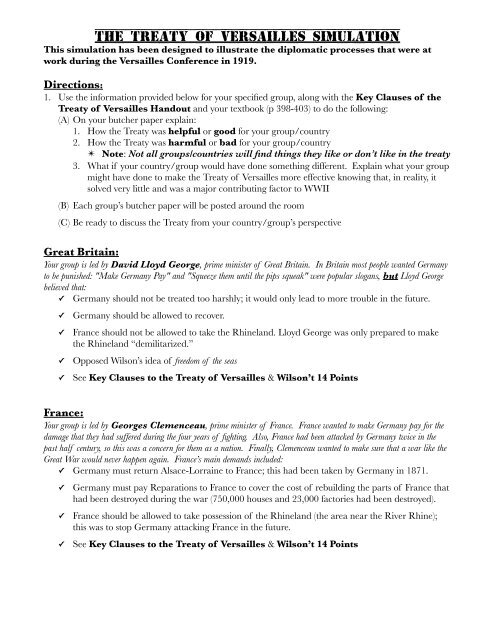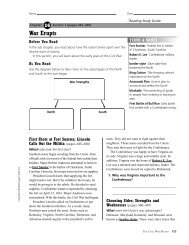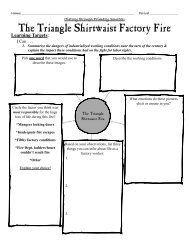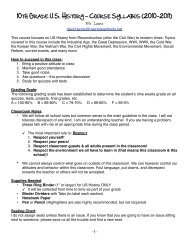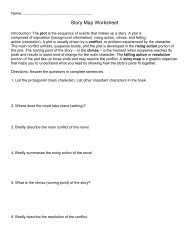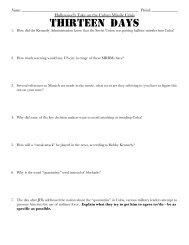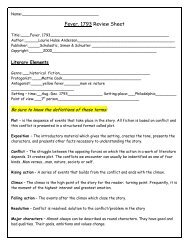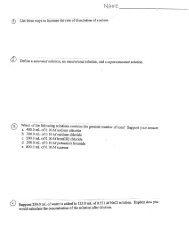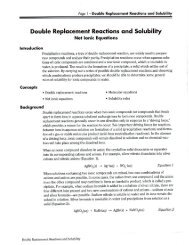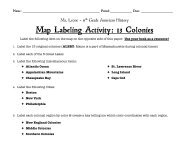Treaty of Versailles (Simulation)
Treaty of Versailles (Simulation)
Treaty of Versailles (Simulation)
Create successful ePaper yourself
Turn your PDF publications into a flip-book with our unique Google optimized e-Paper software.
The <strong>Treaty</strong> <strong>of</strong> <strong>Versailles</strong> <strong>Simulation</strong><br />
This simulation has been designed to illustrate the diplomatic processes that were at<br />
work during the <strong>Versailles</strong> Conference in 1919.<br />
Directions:<br />
1. Use the information provided below for your specified group, along with the Key Clauses <strong>of</strong> the<br />
<strong>Treaty</strong> <strong>of</strong> <strong>Versailles</strong> Handout and your textbook (p 398-403) to do the following:<br />
(A) On your butcher paper explain:<br />
1. How the <strong>Treaty</strong> was helpful or good for your group/country<br />
2. How the <strong>Treaty</strong> was harmful or bad for your group/country<br />
✴ Note: Not all groups/countries will find things they like or don’t like in the treaty<br />
3. What if your country/group would have done something different. Explain what your group<br />
might have done to make the <strong>Treaty</strong> <strong>of</strong> <strong>Versailles</strong> more effective knowing that, in reality, it<br />
solved very little and was a major contributing factor to WWII<br />
(B) Each group’s butcher paper will be posted around the room<br />
(C) Be ready to discuss the <strong>Treaty</strong> from your country/group’s perspective<br />
Great Britain:<br />
Your group is led by David Lloyd George, prime minister <strong>of</strong> Great Britain. In Britain most people wanted Germany<br />
to be punished: "Make Germany Pay" and "Squeeze them until the pips squeak" were popular slogans, but Lloyd George<br />
believed that:<br />
✓ Germany should not be treated too harshly; it would only lead to more trouble in the future.<br />
✓<br />
✓<br />
✓<br />
✓<br />
Germany should be allowed to recover.<br />
France should not be allowed to take the Rhineland. Lloyd George was only prepared to make<br />
the Rhineland “demilitarized.”<br />
Opposed Wilson’s idea <strong>of</strong> freedom <strong>of</strong> the seas<br />
See Key Clauses to the <strong>Treaty</strong> <strong>of</strong> <strong>Versailles</strong> & Wilson’t 14 Points<br />
France:<br />
Your group is led by Georges Clemenceau, prime minister <strong>of</strong> France. France wanted to make Germany pay for the<br />
damage that they had suffered during the four years <strong>of</strong> fighting. Also, France had been attacked by Germany twice in the<br />
past half century, so this was a concern for them as a nation. Finally, Clemenceau wanted to make sure that a war like the<br />
Great War would never happen again. France’s main demands included:<br />
✓ Germany must return Alsace-Lorraine to France; this had been taken by Germany in 1871.<br />
✓<br />
✓<br />
✓<br />
Germany must pay Reparations to France to cover the cost <strong>of</strong> rebuilding the parts <strong>of</strong> France that<br />
had been destroyed during the war (750,000 houses and 23,000 factories had been destroyed).<br />
France should be allowed to take possession <strong>of</strong> the Rhineland (the area near the River Rhine);<br />
this was to stop Germany attacking France in the future.<br />
See Key Clauses to the <strong>Treaty</strong> <strong>of</strong> <strong>Versailles</strong> & Wilson’t 14 Points
The United States (Woodrow Wilson & the Democrats):<br />
Your delegation is led by Woodrow Wilson, the President <strong>of</strong> the United State <strong>of</strong> America. The U.S. had only declared<br />
war on Germany in April 1917. The U.S. had suffered no damage during the war. Wilson arrived in Europe with the<br />
“Fourteen Points,” which he hoped would help prevent wars in the future. Several <strong>of</strong> Wilson’s most important points<br />
included:<br />
✓ The peoples <strong>of</strong> Europe should be allowed to decide their own future (self-determination)<br />
✓<br />
✓<br />
✓<br />
Called for the end European Empires (end Imperialism)<br />
A League <strong>of</strong> Nations should be set up to settle disputes between countries in the future<br />
See Wilson’s 14 points<br />
The United States (Henry Cabot Lodge & the Reservationists):<br />
This group is back in the US & is critical <strong>of</strong> the <strong>Treaty</strong> <strong>of</strong> <strong>Versailles</strong> for several reasons. Focus on what Wilson brings<br />
back from Europe & don’t focus so much on what’s good or bad in the treaty as a whole, but rather what is good or bad for<br />
America & your power as a Congressman:<br />
✓ Many politicians, especially senators who must approve (ratify) the treaty in the United States<br />
opposed the provisions <strong>of</strong> the treaty, as well as the League <strong>of</strong> Nations because they feared it<br />
would tell the US what to do or where to fight.<br />
✓<br />
Believed that the League <strong>of</strong> Nations conflicted with the constitutional power <strong>of</strong> the U.S.<br />
Congress to declare war.<br />
Germany:<br />
The Allies gave Germany a new form <strong>of</strong> government based on proportional representation. It was intended to prevent<br />
Germany being taken over by a dictatorship, but it led to the creation <strong>of</strong> more than thirty political parties; none <strong>of</strong> them was<br />
big enough to form a government on its own. Germany had not been allowed to the Peace Conference and were told to accept<br />
the terms or else. Most Germans had believed that the <strong>Treaty</strong> would be lenient because <strong>of</strong> Woodrow Wilson's Fourteen<br />
Points. Many Germans did not believe that the German army had actually been defeated in 1918 because Germany had<br />
not been invaded. One <strong>of</strong> these people was Corporal Adolf Hitler, who had been in hospital in November 1918 recovering<br />
from gas-blindness. Like many others he came to believe that the army had been “stabbed in the back” by the “November<br />
Criminals,” the politicians who had signed the Armistice which had brought the Great War to an end on November 11,<br />
1918.<br />
Several <strong>of</strong> the clauses <strong>of</strong> the <strong>Treaty</strong> were thought to be very harsh. It was going to be almost impossible to pay the<br />
reparations. In fact, the German government gave up after only one year, and the War Guilt Clause seemed<br />
particularly unfair. How could Germany be the only country to blame for the war? After all it had started when a Serbian<br />
shot an Austrian. It was felt that Germany had simply been made a scapegoat by the other countries for all that had<br />
happened.<br />
Germany was required to:<br />
✓ Accept all <strong>of</strong> the blame for the war, the “War Guilt Clause”<br />
✓<br />
✓<br />
✓<br />
✓<br />
Reduce its army to 100,000 men and was not allowed to have conscription (draft)<br />
Reduce the navy to 6 warships and was not allowed to have any submarines<br />
Destroy all <strong>of</strong> its air force<br />
See Key Clauses to the <strong>Treaty</strong> <strong>of</strong> <strong>Versailles</strong>


